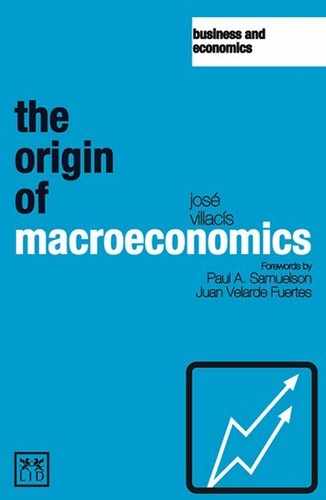Presentation |
|
Germán Bernácer is one of the Spanish economists that history will undoubtedly recognise some day for his outstanding work and groundbreaking contributions in the construction of economic science. As French and English speakers have dominated the economic arena, it is not uncommon that the merits of Spain’s scientists are glossed over and accorded first to foreigners and later, much later, Spaniards are eventually given their due recognition.
This statement is proven true in work done by Professor Robertson, a distinguished economist from Cambridge University who is well known by all Spanish professors. He published the works of Germán Bernácer in the magazine Economica under the title ‘A Spanish Contribution to the Theory of Fluctuations’, in which he referred to Bernácer as ‘renowned Spanish economist’.
Manuel de Torres, in the preface to his translation of Robertson’s book Essay on Monetary Theory, justified the inclusion therein of Bernácer’s work on the theory of monetary fluctuations.
It is remarkable to recall that Germán Bernácer set forth his theory on fluctuations or, even better, his theory on disposable funds in 1923, a full thirteen years before Keynes’ opus, The General Theory, would appear. Bernácer’s work does contain the seed or the essence of part of the field of thought developed later by Keynes. I am not trying to claim that the honoured English economist was inspired by Bernácer’s work, which he may not even have been aware of. However, it is not that improbable in light of the friendship Keynes had with Robertson. What is true in any case is that Bernácer had very clear ideas at that time about the role that money had on real economics. That is, he was clear about the influence of monetary economics on real economics.
Several distinguished professors from the Faculty of Economic Sciences at the Complutense University in Madrid have studied Bernácer’s work and personality. These professors include Manuel de Torres and Emilio de Figueroa, who are regrettably both deceased. However, it has been Professor José Villacís who has delved into the meaning and importance of the contributions of Professor Bernácer most diligently and in the greatest depth.
The curriculum and lengthy list of publications of Professor Villacís is extensive enough both to convey his academic merits and amply guarantee the work he has done on Germán Bernácer.
Furthermore, he has also studied Germán Bernácer’s personality and what I would dare to describe as his multidimensional involvement in the scientific arena. Germán Bernácer came from humble origins and was a self-made man. He would obtain the post of department head for the Testing and Evaluation of Commercial Products at the Business Training School in Madrid (Escuela Superior de Comercio de Madrid) after a competitive selection process. When I studied business at the same school, I was lucky enough to have this eminent man as a teacher, because Professor Bernácer also loved chemistry and laboratory work. This never prevented him from performing in-depth economic studies and holding first the post of director and subsequently the post of assistant director of Research Services at the Bank of Spain. This double facet of Professor Bernácer is detailed and commented upon by Professor Villacís, who also clarifies the apparent anomaly of his supposed demotion, which was simply one further consequence of Professor Bernácer’s modesty. The brilliance of the posts he held overwhelmed him when he just wished to have more time available for study and research.
Bernácer was also an eminently refined man and a great pedagogue. He lived in great simplicity and this was particularly clear –if I may say so due to personally knowing him– in how he treated his students. I believe his own character was his biggest enemy and his natural modesty made him indifferent to others acknowledging his achievements and stunning abilities. It was probably his personality, incapable of fighting or confronting his possible doctrinal adversaries, where the explanation can be found for the marginalisation he was subject to in his life, as Villacís correctly emphasises.
His simplicity and the way he shied away from the limelight whenever possible may also have contributed to the fact that his scientific renown was largely ignored by those of us starting out at the recently-opened Faculty of Political and Economic Sciences. Essentially, we went there to read Anglo-Saxon economic literature.
Thus, I find it commendable that a Spanish professor is presently bringing the works and personality of Germán Bernácer to the public eye. I believe that there is no person better qualified to do so than José Villacís González, who has studied his works and life in such depth, despite never personally knowing the man. The work reflects his signature and excellent style and is full of the passion we could expect in this meritorious, just and long-overdue demand for recognition. He stresses the full importance of the contributions of Professor Germán Bernácer in the construction of financial and monetary economics. Therefore, Mr Villacís will bring him to the public eye of new generations of economists who will surely feel true pride that a Spaniard –a humble chemistry professor by all appearances– was ahead of the subsequent monetary theories with his Theory on Disposal Funds.
José María Fernández Pirla
Professor at the Faculty of Economic and Business Sciences
(Complutense University of Madrid)
